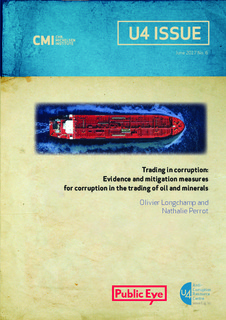| dc.description.abstract | Between 2011 and 2013, sales of government oil from the ten biggest producers in sub-Saharan Africa accounted for 56% of these countries’ total public revenues. Despite their importance, however, such sales have received little political or academic attention until recently. Corruption risks associated with this phase of the commodity value chain are high due to the volumes of the financial transactions, the high degree of interaction with public authorities, the opacity of both the sales themselves and the actors involved, and a lack of regulation. Several case examples show that these risks are not merely theoretical. We summarise the state of research on this subject, paying special attention to buyers, whose responsibilities have been little discussed. We offer a typology of corruption risks in first sale trades of oil and minerals, and analyse existing measures to tackle them.
Series Editor, Aled Williams, on why this U4 Issue matters for donors
Trading in corruption: How effectively responding to corruption in the sale of oil and minerals could help reduce poverty and aid reliance
Terms such as “resource curse challenges”, “political economy problems” and “illicit financial flows” have all become part of the common parlance of anti-corruption work. Policy and academic discussions abound on the factors that determine corruption in resource cursed contexts, and what to do about it. Yet, until recently, there has been hardly any policy or academic discussion of corruption risks associated with producer countries’ sales of so-called “hard commodities” such as oil or minerals. This is despite a recent increase in the significance of commodity production for developing country economies, and the well-known corruption challenges found in the extractive industries. This U4 Issue, based on fresh analysis of Extractive Industry Transparency Initiative (EITI) reports and drawing on a database of | |
